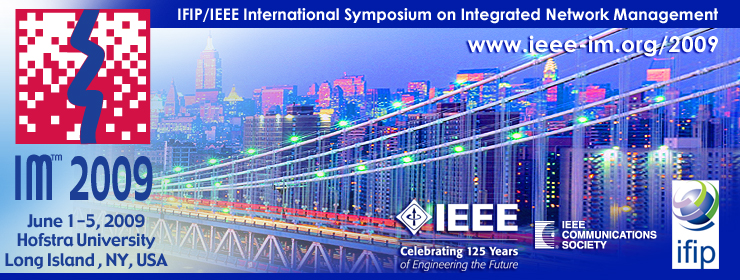|
|
|
IM 2009 Panels
Panel 1
Title: Who is the Judge? - on the Metrics of Service Science Chair: Larisa Shwartz, IBM T.J. Watson Abstract
The panel aims to provide an interactive discussion on service science’s metrics. How could existing measurement methodologies satisfy diverse services’ paradigms and ensure that results are interpreted correctly? How could socio-technical aspects of service science be incorporated in the existing typologies? What are the appropriate metrics to validate service management’s efforts and to quantify the benefits? The focus of the discussion is on understanding applicability of various metrics that are well developed in other areas, e.g. software engineering.
Participants:ه
- Dr. David Northcut, Distinguished Engineer,ه IBM
- Prof Robin Qiu, Penn. State
- Dr. Victor Tang, MIT
- Moderators: G. Grabarnik, L. Shwartz
ههه ---------------------------------------------------------------------------------------- |
Panel 2
Title: Mobile Device and Femtocell Management for 3G and 4G Wireless Networksه Chair: Ming Lai, Telcordia Technologies, U.S.A. Abstract
One of the most important areas in the 3G/4G wireless networks (e.g. EVDO, UMTS, HSPA, WiMAX, LTE) is to cost-effectively manage a huge number (in millions) of mobile devices (e.g. cell phone, MID, laptop, UMPC) carried by individuals or in a vehicle and femtocells (small form factor, low cost access points for licensed radio spectrum connected to landline broadband networks, like DSL, cable, and fiber) in residential homes and offices. In the last few years, automatic or self-organizing solutions have emerged to address various management aspects, such as provisioning, fault, performance, account, security, location management, for such a large set of mobile devices and femtocells. The aim of the panel is to explore this hot issue through a number of questions, e.g.: - What are the challenges? ه
- Are the current management systems and tools viable?
- What are pertinent standards/forum efforts?
- What is the state of the arts of self organizing networks?
- How can the management solution for mobile devices and femtocells integrated with network infrastructure and support systems?
Participants:
- Paolo Narvaez, Alcatel Lucent, U.S.A.
- Vish Kolur, Telcordia, U.S.A.
- Taka Yoshizawa, Thomson,ه Femto Forum
هههه----------------------------------------------------------------------------------------
Panel 3
| Title: The promise of autonomic computing - has it delivered? Chair: Arosha K Bandara, The Open University, UK Abstract
More then 5 years have passed since Kephart and Chess published their vision of autonomic computing. Since then, numerous approaches have been proposed to address the challenges of this vision - from policy-based systems and biologically-inspired computing at the architecture level to techniques for analysing autonomic systems and mapping business requirements into specifications for autonomic behaviour. Members of the panel will review the research advances made from these different perspectives and present their views in response to the following questions: - Are we any closer to addressing the challenges of software complexity?
- How has autonomic computing changed the field of systems management?
- What are the remaining challenges?
- What are the alternatives to autonomic computing?
Participantsه:
- Joe Hellerstein, Google Inc., USA
- Julie McCann, Imperial College London, UK
- Mark Burgess, Oslo University College, Norway
- Claudio Bartolini, HP Labs, USA
ههه ---------------------------------------------------------------------------------------- |
Panel 4
Title: Cloud Computing: What Business Models Will Succeed? Chair: Jerry Rolia, Principal Scientist, Hewlett Packard Labs Abstract:
The success of Cloud Computing ultimately rests on the ability of users to get value from cloud services and cloud providers to make money. Several business models exist today. The virtualized hardware model, as exemplified by Amazon EC2 and S3, sells virtualized hardware instances that can be scaled rapidly. Sandbox service providers, such as Google’s App Engine, charge users for resource usage in an execution environment that runs high level code on the provider’s infrastructure. Service providers such as Salesforce.com use the cloud as a way to sell software on a usage basis. We expect continued innovation and evolution of approaches to Cloud Computing. This panel will explore existing and future technical approaches to Cloud Computing and the associated business models. Questions addressed will include: - What value does cloud computing bring to customers?
- What technical approaches work best for which customers (e.g., large enterprise, small business)?
- How will the computing ecosystem evolve as Cloud Computing gains acceptance?
- What are the management challenges with each approach to Cloud Computing?
- What are the new technical and research challenges in the area of network and service management?
Panelists:
- Alan Crosswell, Associate VP and Chief Technologist, Columbia University
- Joe Hellerstein, Software Engineer, Google
- Giovannni Pacifici, Senior Manager, IBM Research
- Sharad Singhal, Distinguished Technologist, Hewlett Packard Labs
|
ه ه ه ه ه
|
|

